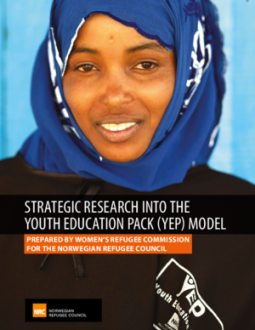
Strategic Research into the Youth Education Pack (YEP) Model
PublishedAn external review of Norwegian Refugee Council programs
Background
The Youth Education Pack (YEP) model offers a one-year, full-day intensive program adapted to country context. A core set of three interventions has emerged as the model evolves:
- teaching of literacy and numeracy skills,
- training in livelihood skills toward (self-) employment, and
- sensitization in various life-skills including health and micro-business management.
YEP also aims to build individual self-confidence and awareness of the roles youth can play in rebuilding their community and nation.
Adaptability
The model has taken many forms, to the extent that it is difficult to speak of any single, standard YEP design. Adaptations include:
- Establishing links to labor markets through apprenticeship contracts with local businesses run by trained artisans
- Less focus in vocational training on trade skills (carpentry, plumbing, etc.) and more on agriculture and animal husbandry in response to lack of demand for the latter in rural areas
- Expansion into areas such as computer literacy, satellite installation and secretarial courses
- Integration of the life skills component into the curriculum of the literacy and numeracy classes
- Inclusion of a peace education focus to the life skills component
Cost Effectiveness
While YEP is acknowledged to be more expensive than academic programs that don’t include TVET, program staff and guidance documents both point to the necessity of higher investment to achieve the desired outcomes and impacts. The report presents a menu of options for potential adjustments to the YEP program with an eye toward cost savings and scaling up.
Sustainability
Sustainability of YEP is constrained by both a lack of capable partners in government, civil society and the private sector, as well as high costs that make it too expensive to hand over to the government or other agencies.

